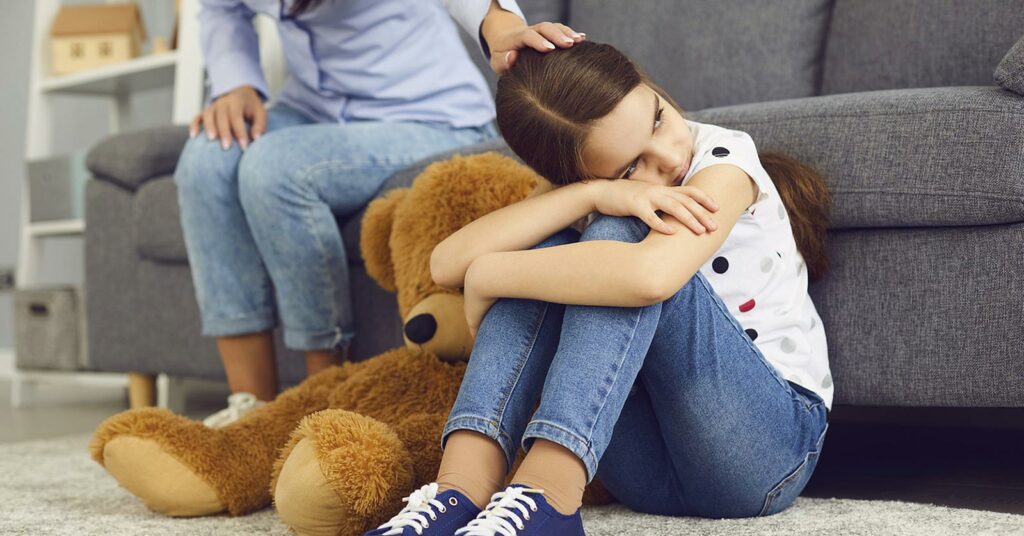
One of the biggest misconceptions about depression is that it’s an adult-only illness. Unfortunately, children and adolescents suffer from depression. Sometimes parents and caregivers may not be able to recognize the signs of this disorder as signals can be passed off as regular psychological or emotional changes, and a child may go undiagnosed and untreated.
What Is Childhood Depression?
Childhood depression is different than a moody kid who sometimes seems down or upset. Children, like adults, have times when they feel “blue” or sad. Emotional fluctuations are normal. But if those feelings and behaviors last longer than two weeks, they may be a sign of an affective disorder like depression. Persistent sadness and symptoms can interfere with daily life, interrupting school, and social activities. (Holland 2019)
Symptoms of Childhood Depression
Children may experience the same symptoms that adolescents and adults do, but they may have trouble expressing themselves. They may not be able to describe their feelings due to their limited emotional vocabulary.
The primary symptoms of depression revolve around sadness, a feeling of hopelessness, and mood changes.
Signs and symptoms of depression in children include
- Irritability or anger
- Continuous feelings of sadness and hopelessness
- Social withdrawal
- Increased sensitivity to rejection
- Changes in appetite — either increased or decreased
- Changes in sleep — sleeplessness or excessive sleep
- Vocal outbursts or crying
- Difficulty concentrating
- Fatigue and low energy
- Physical complaints (such as stomachaches, headaches) that don’t respond to treatment
- Reduced ability to function during events and activities at home or with friends, in school, extracurricular activities, and in other hobbies or interests
- Feelings of worthlessness or guilt
- Impaired thinking or concentration
- Thoughts of death or suicide
(WebMD 2020)
Causes of Childhood Depression
There could be several factors that could contribute to childhood depression. Here are some of the risk factors.
Stress – Sometimes stressful events at home, school, or with friends could be the triggers behind a child’s depressive symptoms.
Physical Health – Children suffering from chronic or severe medical conditions like obesity could put a child at risk for depression. They may feel like an outsider if they are not able to participate in activities at home or at school.
Family History – Family history also has a role to play in the risk factors. Children whose family members have a history of mood disorders or depression may be at a higher risk for depressive symptoms.
Environment – Children are sensitive to the environment around them. If the home environment is chaotic or stressful, it can affect the children’s well-being. They may be more likely to be depressed.
Biochemical Imbalances – When certain chemicals or hormones in children are unbalanced, it can affect how their brain works. This could also be one of the causes of depression.
These risk factors may alone not be responsible for depression. However, they could play a significant role in the chances of a child developing depression.
Treatment for Childhood Depression
The treatment for children dealing with depression could involve therapy, prescription medicine, or a combination of both. The treatment would depend on how severe the symptoms of depression are.
Therapy
Usually, the first line of treatment if a child is diagnosed with depression is psychotherapy. This therapy addresses the life factors and emotional events that increase the risk of childhood depression.
Another option is cognitive behavior therapy (CBT). This therapy involves speaking about emotions, analyzing what changes are needed, and finding ways to make those changes. For young children with a limited vocabulary, play therapy may be used. During play therapy, toys and entertainment are used to help children reinforce their feelings.
How to Help Your Child with Depression
The best way to treat childhood depression is to talk with your child as you need to understand what’s happening. Sometimes this may be a difficult conversation to have, but it will help you know what they’re feeling and experiencing.
If you cannot speak with your child, be observant, and take notes. Keep a diary and write down any observable changes as this can help your child’s doctor understand the situation better.
Childhood depression is treatable, and it is a mental health issue that must be taken seriously. Do not put off seeking medical help due to the social stigmas attached to depression. As parents, it’s essential to realize the importance of treatment so your children’s physical and emotional growth and well-being are on the right track.
Works Cited
Holland, Kimberly. “Childhood Depression: Symptoms, Causes, Treatment & More.” Healthline, Healthline Media, 21 Feb. 2019,
healthline.com/health/mental-health/childhood-depression.
WebMD. “Depression in Children: Symptoms and Common Types of Child Depression.” WebMD, WebMD, 7 June 2020,





